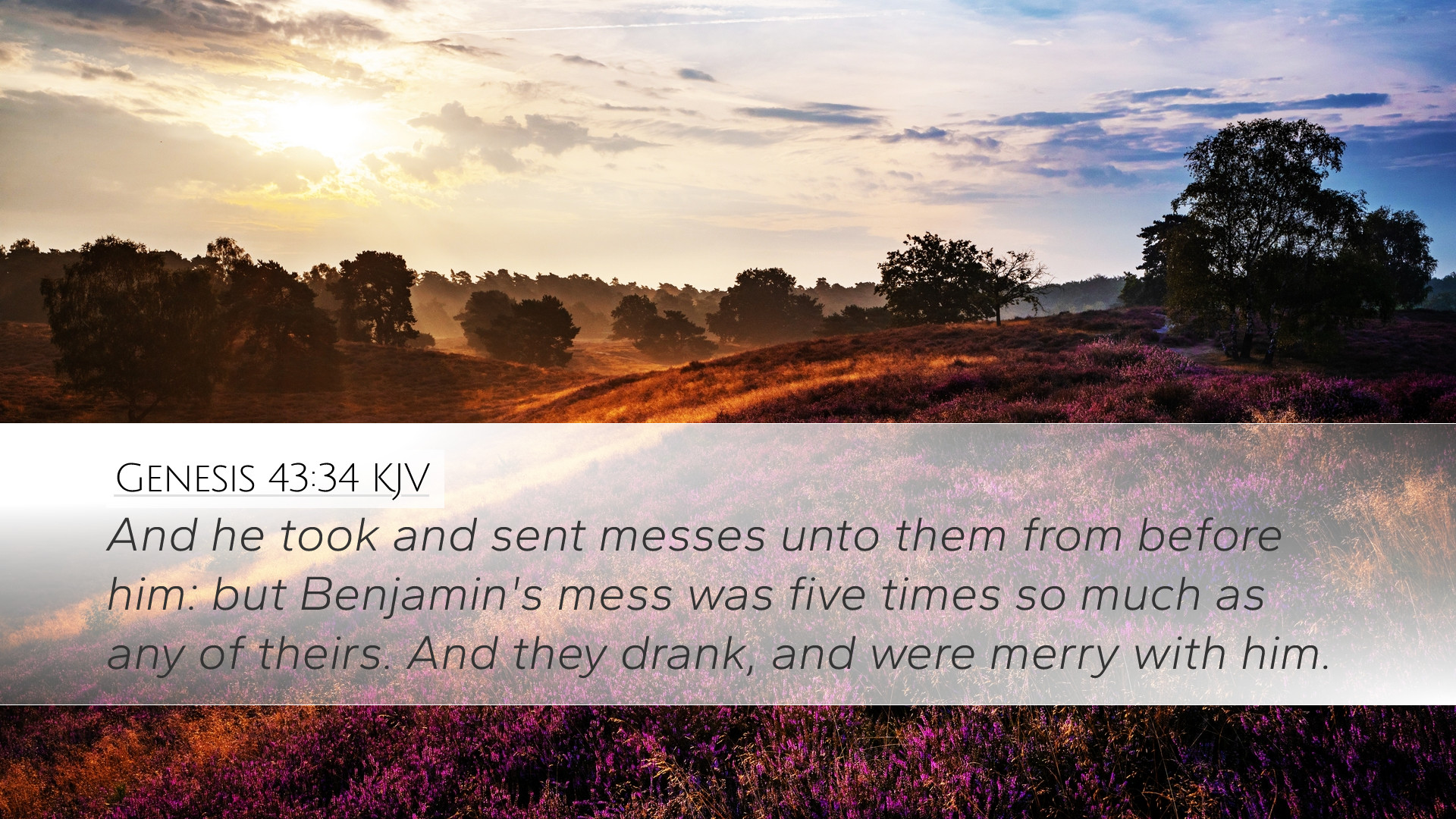Commentary on Genesis 43:34
Genesis 43:34 reads: "And he took and sent messes unto them from before him: but Benjamin's mess was five times so much as any of theirs. And they drank, and were merry with him."
Contextual Background
In this passage, Joseph, who had risen to power in Egypt, is hosting his brothers during a time of famine. Their return to Egypt was marked by fear and uncertainty due to their previous dealings with Joseph, whom they did not recognize. This chapter, and indeed the entire narrative, focuses on themes of family reconciliation, providence, and divine sovereignty.
Matthew Henry's Insights
Matthew Henry emphasizes the deepening relationship and affections between Joseph and his brothers, particularly focusing on how Joseph's actions reflect both his power and his desire to test their character.
-
Joseph's Generosity: Henry notes that Joseph's choice to provide his brothers with a feast demonstrates his desire to convey both kindness and superiority. The lavish provision for Benjamin—five times more than the others—acts as a test of the brothers’ integrity and their feelings toward Benjamin.
-
The Symbolism of Benjamin's Portion: The significant portion given to Benjamin serves not only to highlight his favored status but also challenges the brothers' jealousy and fears stemming from their prior actions regarding Joseph.
-
Joy in the Midst of Testing: The phrase "they drank, and were merry with him" illustrates a shift from their earlier guilt to a newfound joy. This suggests a restoration of relationships, highlighting how divine providence can turn fear into joy.
Albert Barnes’ Perspective
Albert Barnes provides a detailed analytic perspective on the social customs of the time, noting how the act of sharing a meal carries deep significance in Ancient Near Eastern culture.
-
Cultural Concepts of Hospitality: Barnes expounds on the importance of hospitality in the ancient context, where sharing food symbolizes trust and reconciliation. Joseph's role as the host signifies a reversal of power dynamics as he generously provides for his brothers.
-
Contrast and Reconciliation: He points out that Benjamin's larger portion is not merely a sign of favoritism but serves to reconcile the painful past where he was isolated. This showcases the transformative power of grace and forgiveness.
-
Impact of Divine Providence: Barnes suggests that this moment is a manifestation of divine providence, reflecting God's overarching narrative of salvation that unfolds through trials and ordaining reconciliation even in strained family dynamics.
Adam Clarke's Analysis
Adam Clarke focuses on the theological implications of this incident, interpreting the passage through the lens of divine sovereignty and human agency.
-
Theological Reflection: Clarke reflects on how God orchestrates events in believers' lives to achieve His purposes. He interprets Joseph's actions as a divine orchestration for a greater plan of restoration.
-
The Nature of Joy: Clarke notes that the joy experienced by Joseph's brothers was a divine gift, a contrast from the burdens of guilt they carried. This highlights the biblical theme that true joy arises from reconciliation with God and others.
-
Five Times More: Clarke elaborates on the significance of the "five" in biblical numerology, suggesting that it symbolizes grace in this context. Benjamin receiving five times as much could signify an extraordinarily gracious act that surpasses human understanding.
Theological Implications for Ministry
This passage carries profound implications for pastoral ministry, Students of Scripture, and theological scholars.
-
Forgiveness and Restoration: The narrative outlines the process of forgiveness and highlights how relationships can be restored through God's grace, a fundamental tenet in pastoral care and counseling.
-
Divine Providence: Understanding that God can use familial strife for His purpose provides a framework for believers to trust in God’s plans during challenging situations, reassuring those involved in ministry to guide individuals toward expressing hope and faith in divine sovereignty.
-
Celebration of Grace: The imagery of joy among former enemies presents a powerful case for the transformative love of Christ, reminding ministries to celebrate and share grace, fostering unity within the church.
Conclusion
In conclusion, Genesis 43:34 serves as a multifaceted exposure to themes of reconciliation, grace, and divine orchestration. The insights from Matthew Henry, Albert Barnes, and Adam Clarke converge to enrich our understanding of this pivotal moment in the story of Joseph and his brothers. The weight of this verse invites pastors, students, and scholars to reflect on their roles in promoting reconciliation and experiencing divine joy through Christian fellowship. As institutions of faith, it is imperative to recognize that the narrative of Joseph is more than an ancient account; it is a living testimony of God's ability to transform lives through grace and divine purpose.


